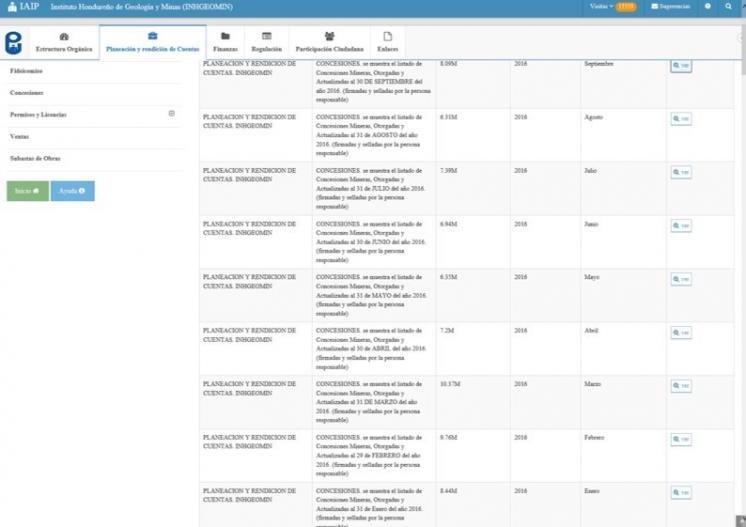
Honduras’ 2014 EITI Report provides improved information on mining and identifies gaps in revenue collection. With the outlook for the sector uncertain, there are several opportunities for the EITI to make an impact.
The 2014 EITI Report provides a concise summary of the mining sector in Honduras, drawing on and supplementing the information available in the transparency portal of the mining regulator and cadastre agency INHGEOMIN. The introduction of the EITI in 2013, enshrined in the Mining Law of 2013, helped to catalyse INHGEOMIN’s efforts to make this information publically accessible.
INHGEOMIN’s Transparency portal.
"Through EITI, INHGEOMIN has gained needed political support to carry out reforms to improve our cadastre. We aim to continue delivering transparent, reliable and timely information on the use of the country's mining resources."
Agapito Rodríguez, Executive Director, INHGEOMIN
In 2014, Honduras received USD 14.5 million in revenues from the mining sector. Seven companies accounted for 92% of government revenues (USD 13.4 million) and 89% of the mineral exports. The Report also highlights the need for the tax office DEI (Direccion Ejecutiva de Ingresos) to improve its internal systems. In fact, DEI is currently being restructured under a public finance reform package implemented with the support of the International Monetary Fund.
The report also identifies a revenue flow that, while mandated in the 2013 Mining law, has not been collected. The Coalianza is a government-led initiative to partner with the private sector in channelling funding to big infrastructure projects. The 2013 Mining Law established a contribution of 1% of the value of sales or exports of metallic mineral companies to Coalianza. However, the 2014 EITI Report finds that the government had yet to collect this revenue. The report urges the government to establish which collecting agency will be responsible for this tax and the collection procedures.
A third of revenues go to municipal governments
As in many other countries, a key focus of public debate is how these revenues are spent. The 2014 EITI Report shows that a third of revenues are collected by municipalities where mining takes place. The reconciliation of local payments revealed significant discrepancies, highlighting weaknesses in public financial management systems. Municipalities also failed to report revenues from companies not participating in the EITI Report. There are opportunities to use the EITI Reporting process to strengthen these systems.
“EITI is helping municipalities with presence of the extractive sector to identify opportunities for strengthening our management of the resources we receive from mining companies”
David Castro, Major of the Cedros municipality
Know what you produce
Only exporting companies have the obligation to report mineral production. Moreover, production data is based on exporting companies’ self-declarations. The report recommends that Honduras makes it mandatory for all companies to disclose production volumes.
What next for the EITI in Honduras?
The mining sector contributes 1% of GDP and 4% of Honduras’ exports. In 2014, extractive revenues represented 0.8% of total government revenues. Deep-rooted anti-mining sentiment is a significant barrier to developing the mining sector. The contract signed in 2013 with British Gas (BG) to explore for oil in the offshore Mosquitia area raised expectations for future significant revenues. With current low oil prices, the outlook for this project is uncertain.
Carlos Patiño from Caritas Honduras, a civil society member of the multi-stakeholder group, said:
“The integration of the EITI Principles and obligations in the 2013 Mining Law are now tangible in the Honduras 2014 EITI Report. Citizens can now monitor how the law is being applied to govern the mining sector. We take this opportunity to make a call to the Government of Honduras to make transparency and accountability processes sustainable in the country”.
Access the Honduras 2014 report
For more information about the EITI process in Honduras, please visit the country page on eiti.org or consult the national EITI website.
Related content






